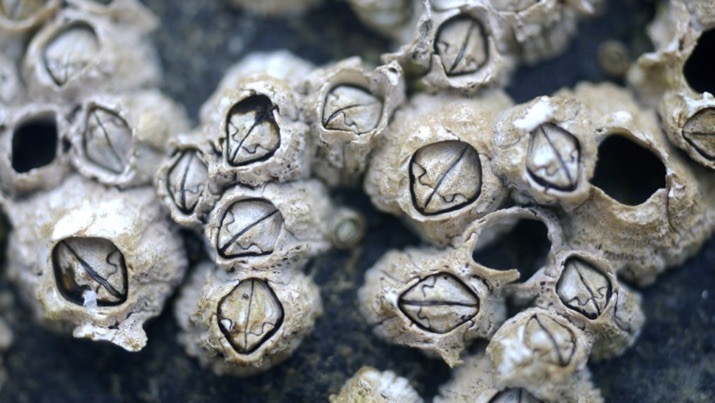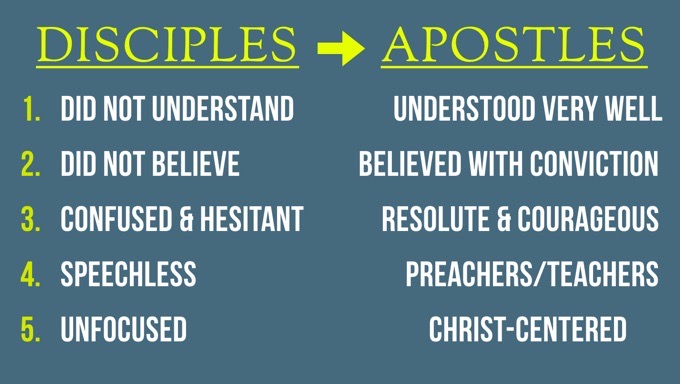
Romans 8: 26-30
The Story so far
Today we consider the birth of the Church—the big bang of Christianity and Christendom—which changed everything. It’s also Reformation Sunday, a day wherein we remember our heritage but also remind ourselves of the processes that make us who we are. Today we’ll discuss the Holy Spirit, metanoia, and barnacles—yes, like the kind that stick to boat hulls.
1. THE HOLY SPIRIT
Pentecost is not merely the birthday of the Church, but it is the beginning of a new age. The advent of the Holy Spirit began a new era in which God pours his Spirit out upon all flesh, as prophesied in Joel. The Holy Spirit means everything, compared to which human effort, cooperation, mission, goals, and zeal amount to nothing. Consider the difference between the Disciples and the Apostles, who were in fact the same men.

There is nothing in and of these men to have made such a change. They were ordinary “also rans” as followers—not the cream of the crop by any means. Yet look at the difference—the transformation—between their former lives and what they ultimately became: charged witnesses, missionaries, and martyrs for the name of Jesus.
Jesus promised to send them the Spirit:
But the Advocate, the Holy Spirit, whom the Father will send in my name, will teach you all things and will remind you of everything I have said to you. —John 14:26
The word advocate is from the word Paraclete. The literal meaning is one who stands beside you to speak on your behalf: an attorney! The promised Spirit comes along beside us as an advocate up and against our Adversary, Satan, who is the prosecuting attorney of the heavenly court.
Paraclete is also translated as Comforter. The Spirit is the presence of God with us in our trials and distress. We experience God as the Holy Spirit, who gives us God’s presence and the peace of Christ which passes our understanding:
7 But very truly I tell you, it is for your good that I am going away. Unless I go away, the Advocate will not come to you; but if I go, I will send him to you. 8 When he comes, he will prove the world to be in the wrong about sin and righteousness and judgment: 9 about sin, because people do not believe in me; 10 about righteousness, because I am going to the Father, where you can see me no longer; 11 and about judgment, because the prince of this world now stands condemned. —John 16: 7-11
The Holy Spirit is also the Convincer/Convicter of our hearts. The Greek word for convince and convict is one and the same. To have a conviction is to be resolutely convinced of the truth of something, and it is a mystery how we come to our convictions. Life’s trials may lead you to such a conviction, or careful study, or perhaps you come to believe a thing for reasons you cannot describe or explain. Scripture tells us this is the work of the Spirit.
But when he, the Spirit of truth, comes, he will guide you into all the truth. He will not speak on his own; he will speak only what he hears, and he will tell you what is yet to come. —John 16:13
We receive gifts from the Holy Spirit, but I steer away from the type of codified lists popular with many Christians. I don’t think the gifts work that way. The gifts of the Holy Spirit are part and parcel of the Spirit’s various roles:
As our Advocate, the Spirit gives us gifts of faith, belief, and trust. As Comforter, the Spirit gives us that mysterious peace of Christ which goes beyond all reason and understanding. As the Convincer/Convicter, the Spirit gives us conviction, boldness, and courage in the truth and message of the Gospel.
Our lives are changed, and there is a name for the change: Metanoia.
2. METANOIA
The word metanoia is translated in several ways, so it may be helpful to consider its most literal meaning:
Meta means after, above, or beyond.
Noia comes from nous, which is mind.
Aftermind, beyond-mind, above-mind—all of these are most literal meanings. It is most commonly translated to the English words convert and repent. I’m going to say that repent is today perhaps the poorest translation.
The problems with reading metanoia as repent involve what we, the Church, have made of repentance. For much of the Church, repentance means a kind of preoccupation with past sins—a piety ground in the unending preoccupation with sinfulness—and this unfortunate. Yes, we are all sinners—so what? We turn from it and do not need to wallow in it, as many Christians have come to do.
There is a selfish, self-absorbed quality to over-focusing on our sins. It can keep us turned inward with a never-ending awareness of our unworthiness before God. Yes, you and I are unworthy: so what? We have been forgiven and redeemed: shouldn’t our focus and preoccupations be shaped by our redemption more than our sin? Does our piety reflect our redemption or our pre-redeemed state?
When John the Baptist preached metanoia and baptism including the forgiveness of sins, there is nothing indicating that a focus on past sins was central. Likewise, when Jesus preached “Metanoia, the kingdom has come near,” there was no focus on past sins, but rather the new life, a new mind, and a new attitude and direction. It’s time we let the word repent sink into the faded credulity of the King James Version and its day.
Better translations were upheld by Reformers. Luther said metanoia was simply “a change of mind.” Calvin gave metanoia four parts:
- 1.Withdrawal from ourselves.
- 2.Turning toward God.
- 3.Setting aside the old.
- 4.Putting on a new mind.
Treadwell Walden, an Episcopal pastor who wrote at length about metanoia in the late 19th century, defined it as: “a change of mind, a change in the trend and action of the whole inner nature, intellectual, affectional, and moral.”
That’s a beautiful and articulate translation, but a bit intellectual. Do you remember Apple Computer’s ad campaign of twenty years ago? It is a perfect translation of metanoia:
To “think different” is to switch, to convert, or to have a new mind about something (just computers, unfortunately), but this is close to what metanoia means. The Holy Spirit, speaking through the prophets, call the people of God to Think Different about their lives and lifestyles. As does Jesus. When we come to follow Christ, we are inviting more than a system upgrade; we are switching to an entirely different platform.
The problem with conversion is that we tend to cling to what we like rather than what God wants.
3. BARNACLES
The motto of the Presbyterian Church voices the spirit of the Reformation in a single phrase:
Ecclessia Reformata, Semper Reformanda: The Church Reformed, Always Reforming.
Let’s be clear: this isn’t the same thing as changing for change’s sake. I don’t mean to pick on our Methodist friends, but their present motto is God is still speaking. This soundsme dangerously like what God has said clearly in Scripture may be insufficient or irrelevant, therefore we can listen for God to say something other than he has already said.
What was Israel’s #1 problem? Idolatry, which is making God whatever we feel like God ought to be. It’s still central to human nature, and the Church has been riddled with idolatry from its earliest toddler days.
All of us carry the idol-making mechanisms within us. How long was it before the early church reinvented the priesthood? (There are no priests other than Christ in the New Testament). How long before Christians venerated Mary and the Saints? All are barnacles.
Barnacles are those crustaceans which cling to the hull of boats and the reason why boat owners spend thousands keel-hauling their ships into dry dock in order to have them scraped off on a regular basis. The Church has taken on barnacles from the beginning, and they must be removed on a regular basis or else they become part of the boat and people don’t know where the barnacles end and the boat begins.
Our little idolatries, our cherished notions about things, our sentimentalisms—all run the risk of attaching themselves to our faith and becoming ossified into our practices.
The Spirit of the Reformation was precisely barnacle-removal. No popes in Scripture? Then none in practice. No priests, no altars, no ongoing sacrifices? Then goodbye to the Mass. All the accumulated barnacles became indistinguishable from church dogmatics, whether they matched the practices of the Apostles or not.
I have to believe that if ships had feelings, then removing barnacles would hurt. So removing our barnacles hurts, which is why we resist it and fight it as long as possible. We must be “always reforming” by painstakingly aligning our Christian beliefs, attitudes, and practices with the written Word and will of God.
What are our barnacles? We should always examine and re-examine our lives to find them and have them removed.
I’m going to name a couple examples associated with Christmas, because a month from now I will be absolutely silent about these (I’m not that brave).
- 1.Jesus was not born on December 25th. It is not “Jesus’ birthday,” though our children will sing it.
- 2.There were no wise men at the manger. All of our Christmas creches are wrong. The wise men came along later—as much as two years later.
- 3.There is no inn in Bethlehem and no inn-keeper. It’ all pure myth and elaboration based upon bad interpretations of the text. The word “inn” is not used in the nativity narratives.
“But I LIKE to think of them that way!”
Yeah, and that’s the problem. It becomes about pews, organs, and potlucks rather than essential tenets.
We must remain vigilant in our barnacle removal, never allowing sentimentality—those good ol’ churchy feelings—to take the place of our very best interpretations of Scripture. We are to reform—which means re-conform—our lives, our practices, and our attitudes into alignment with Scripture. That is what the Reformers did, and that is what it means to be Reformed today.
We submit ourselves and every aspect of our lives to the judgment of God’s Word. It’s as basic as the Lord’s Prayer:
Your Name (not ours or our pride)
Your Kingdom (not our little kingdoms or our own goals)
Your Will (not what we want)
I’ll close with a quote from the late Eugene Peterson, who went to be with the Lord this week:
When Jesus said, “Follow me” and pointed to Golgotha, I don’t think he had in mind our present day pictures of suburban Christianity.†